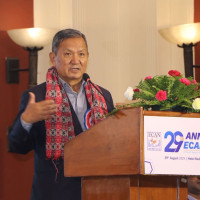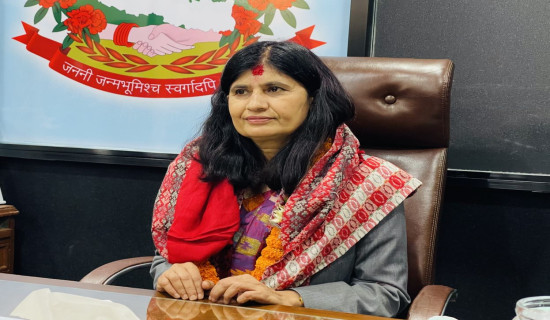- Saturday, 30 August 2025
Single Women Farmers
As part of our 50-hour internship requirement for the Bachelor of Arts in Social Work programme at St. Xavier’s College, Maitighar, my classmates and I were placed in various communities. I never expected my placement to be in a field, but that’s exactly where I found myself — and where I discovered one of the most profound lessons of my life.
I met my first farming teachers in a sunny field in Sunakothi, Lalitpur. They were a group of women, most of whom were well over 60, their hands lined with the marks of a long life of work. They are the Ekal Mahila, the single women, the heart of Chhari Ekal Mahila Kristi Farm. Before I’d even said hello, I could feel a powerful mix of strength, dignity, and warmth. I had shown up feeling nervous and out of place, unsure of where I fit in with classmates from other sections whom I didn't know well. I left 50 hours later, feeling changed and with a new sense of respect, having completed an internship that taught me more than any classroom possibly could.
Our job was to learn how to farm. However, what we actually learned was far more significant than that. The women were so kind and patient with us. They showed us how to plant pumpkin, pea, and corn seeds, even though our hands were clumsy and new to the work. They taught us that farming isn't just dropping seeds in the dirt. It's understanding the land, the weather, and all the little signs that a plant is healthy and growing.
We worked through all kinds of weather. One day, we were ploughing the field in the rain. We got totally soaked, and the wet, sticky mud clung to our boots. It was exhausting, but it also felt amazing, like we were truly connected to the earth in a way I’d never felt before.
Another day, the sun was burning hot. Our backs were sore, and sweat ran into our eyes, making them sting. In those hard moments, I could really feel in my tired body how much effort it takes to grow the food we eat every day. It’s something you can’t really understand just by reading about it in a classroom; you have to feel it yourself.
The biggest lesson came not from the work itself, but from the workers. We learned the story of the farm, a tale of sadness and amazing strength. These women, pushed aside and left alone by society, refused to let their situation limit them. They shared stories of how, at an age when many expect to rest, they found new purpose by working together. They came together and took control of their lives through the very soil beneath their feet. Their farm was more than a way to get food; it was proof of the power of community and a will that cannot be broken. It was their answer to being forgotten, a vibrant, living proof of their value.
Their care for others didn't end with their own farm. I was fortunate to join a two-day pickle-making training they offered free to women in their community. Using their own home-grown vegetables, they taught others how to make pickles not just as a food, but as a way to earn money and feel more independent.
Away from the farm, we used what we learned in school to connect with the local community. There were only four of us and not much time, and we also faced a language gap. Since I speak Newari, I helped translate for my friends so we could truly understand and be understood by the people living there.
It made me see that I wasn’t just a student anymore, I was a bridge. Real communication isn’t just about words; it’s also about respect and meaning. This hands-on experience was harder than any class, but so much more meaningful. We saw with our own eyes how ideas from books actually affect real people and their lives.
I started nervously, but ended up feeling really proud of what we did together and the friendships we made. I wasn't just a student anymore; I became someone who could help my team connect with others. This experience showed me that real strength isn't about being loud; it's about quietly keeping going and caring for your community. I'm so thankful for the skills I learned, for how patient the women were with us, and for the chance to use my language to help my team. This internship completely changed how I see social work and my role in it.
















